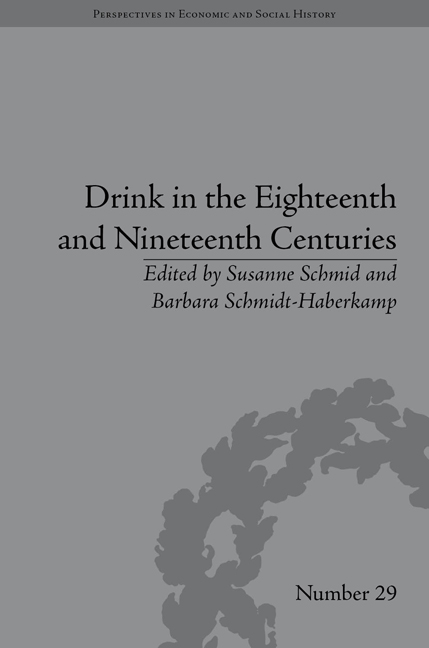Book contents
- Frontmatter
- CONTENTS
- Acknowledgements
- List of Contributors
- List of Figures and Tables
- Introduction
- Part I Ritual and Material Culture
- Part II Institutions and Social Class
- Part III Temperance and the Misery of Alcohol
- Part IV Intoxication and Therapy
- Part V Case Studies: Rum, Cocoa and Magical Potions
- 12 ‘Been to Barbados’: Rum(bullion), Race, the Gaspée and the American Revolution
- 13 A Beverage for the Masses: The Democratization of Cocoa in Nineteenth-Century American Fiction
- 14 The Power of the Potion: From Gothic Horror to Health Drink, or, How the Elixir became a Commodity
- Notes
- Index
13 - A Beverage for the Masses: The Democratization of Cocoa in Nineteenth-Century American Fiction
from Part V - Case Studies: Rum, Cocoa and Magical Potions
- Frontmatter
- CONTENTS
- Acknowledgements
- List of Contributors
- List of Figures and Tables
- Introduction
- Part I Ritual and Material Culture
- Part II Institutions and Social Class
- Part III Temperance and the Misery of Alcohol
- Part IV Intoxication and Therapy
- Part V Case Studies: Rum, Cocoa and Magical Potions
- 12 ‘Been to Barbados’: Rum(bullion), Race, the Gaspée and the American Revolution
- 13 A Beverage for the Masses: The Democratization of Cocoa in Nineteenth-Century American Fiction
- 14 The Power of the Potion: From Gothic Horror to Health Drink, or, How the Elixir became a Commodity
- Notes
- Index
Summary
To understand the history of cocoa and its consumption is to understand the politics of power and the economy of the privileged. Although the focus of this chapter will be power dynamics as reflected in nineteenth-century literary texts, I shall first give a brief history of the paradoxical meanings associated with chocolate – starting as a magical brew for the gods, beverage of the oppressed and exotic libation for the oppressor.
The value of cocoa and later of chocolate is inherently associated with power struggles and, as a result of its commodification, with social status and with exploitation. ‘Chocolate’ or ‘cocoa’ has its origins in ‘Theobroma cacao’, which is Latin and means ‘food of the gods’. Since its inception as a word or as a concept, cocoa has been most problematic with its dual meanings of possession and dispossession. The origin of the word ‘chocolate’ dates back to the Aztecs in Mesoamerica, in whose culture ‘xocoatal’ means the bitter beverage derived from cocoa beans, and as cocoa was seen as magical, offerings of cocoa were often made to the gods. At the same time, Aztecs would offer sacrificial victims cocoa as a palliative beverage to drink before their death, so cocoa was associated with life-affirming practices as well as death rituals. With the conquest by Hernán Cortés, the sweet and bitter aspects of cocoa became even more apparent.
- Type
- Chapter
- Information
- Drink in the Eighteenth and Nineteenth Centuries , pp. 151 - 166Publisher: Pickering & ChattoFirst published in: 2014



